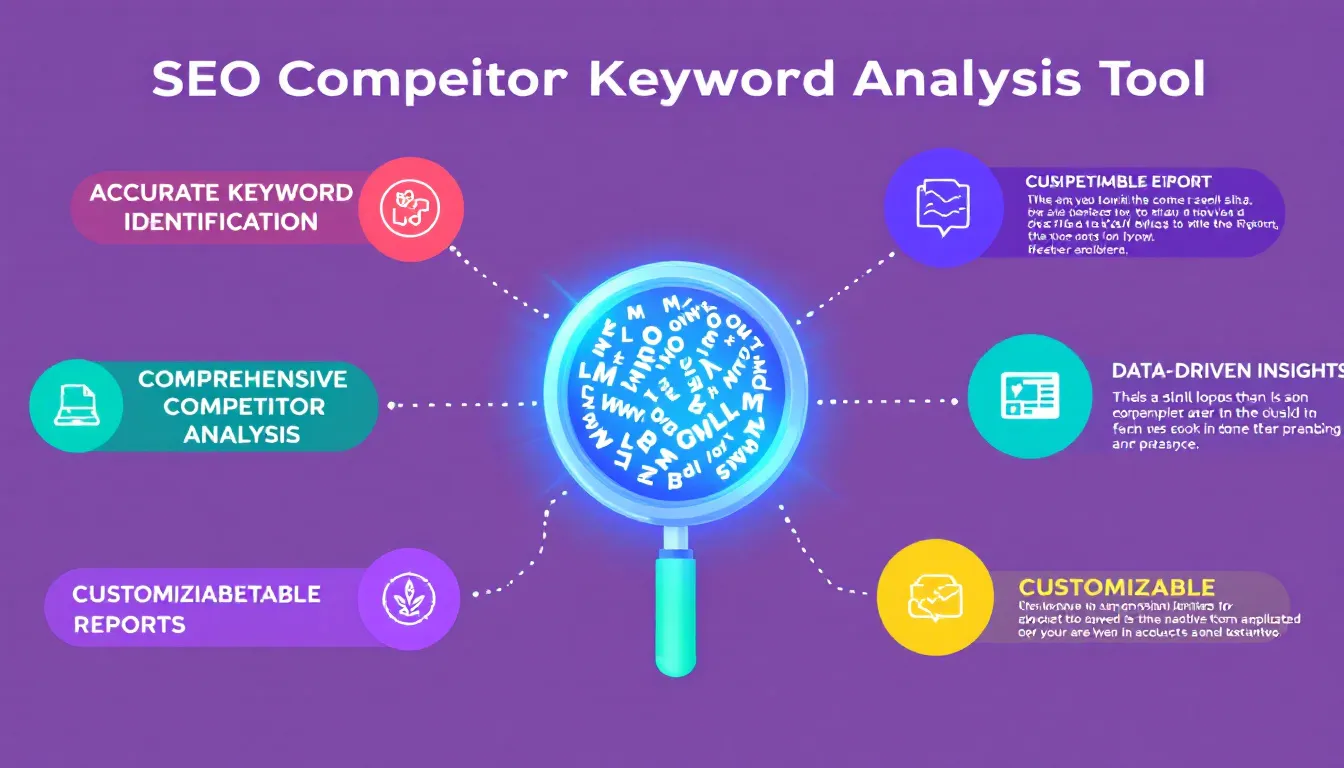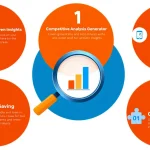SEO Competitor Analysis
Is this tool helpful?
How to Use the SEO Competitor Keyword Analysis Tool Effectively
Follow these steps to get actionable insights from the tool and uncover valuable keyword opportunities in your industry:
-
Enter Your Market Niche: Provide a clear, specific description of your target market. For example:
- Electric bicycles for urban commuters
- Gluten-free baking mixes
-
List Your Top Competitors: Input up to 5 key competitors, one per line, targeting the same niche. Examples:
- UrbanCycle Pro
- Metro Pedal Co.
- WheelyGreen
- CycleSmart
- CityRide Bikes
-
Specify Preferred SEO Tools (Optional): If you use tools for keyword research or competitor analysis, list them separated by commas, like:
- Serpstat, Ubersuggest, SpyFu
- Google Keyword Planner, SE Ranking
- Start Your Analysis: Click the Analyze Competitors button to submit this information. The tool will process your input and provide a detailed keyword analysis report.
The report shows shared and unique competitor keywords, plus recommendations to improve your SEO strategy and increase organic traffic.
Introduction: What Is the SEO Competitor Keyword Analysis Tool and Why Use It?
The SEO Competitor Keyword Analysis Tool helps you dive deep into your competitors’ keyword strategies within your market niche. By analyzing their top-performing keywords, you get insights that improve your own search engine ranking and content relevance.
Purpose of the Tool
This tool identifies your competitors’ high-impact keywords, spotlights gaps in your current SEO approach, and suggests new keyword opportunities. It leverages existing market data to help you refine your content and better target potential customers.
Key Benefits for Your SEO Strategy
- Save Time: Use competitor insights to avoid guesswork and speed up keyword research.
- Make Data-Driven Decisions: Focus on keywords proven to drive traffic within your niche.
- Discover New Opportunities: Find untapped keyword niches your competitors have missed.
- Understand Market Positioning: Learn what keywords define your competition’s visibility online.
- Inspire Content Creation: Generate fresh ideas aligned with established search trends.
Practical Usage: Applying the Tool to Improve Your SEO
This tool helps you create a focused keyword strategy based on competitor data, allowing you to target relevant search terms more efficiently. Here’s how you use the results:
Analyzing the Report
- Common Keywords: Keywords frequently used by multiple competitors that indicate important market trends.
- Unique Keywords for Each Competitor: Specialized terms specific to competitors, signaling niche opportunities.
- Suggested Keywords: Recommended keywords based on gaps or emerging topics that you can target to stand out.
Example Scenario
Imagine you run an online store focusing on sustainable travel gear. After inputting your niche and competitors, the tool may identify:
- Common Keywords: “eco-friendly backpacks,” “sustainable luggage,” “recycled travel accessories”
- Unique Keywords for Competitor X: “solar-powered chargers,” “biodegradable toiletry kits”
- Unique Keywords for Competitor Y: “vegan travel pillows,” “organic cotton travel towels”
- Suggested Keywords: “lightweight eco travel gear,” “plastic-free travel essentials,” “carbon-neutral luggage options”
Taking Action Based on Results
- Develop product lines around the unique competitor keywords to expand your market reach.
- Create blog content targeting suggested keywords to capture emerging search traffic.
- Optimize product descriptions for common keywords to improve your site’s overall search relevance.
- Craft marketing campaigns focused on suggested keywords like “carbon-neutral luggage” to differentiate your brand.
Maximizing Your SEO Success with Competitor Keyword Insights
1. Analyze Regularly
Perform competitor keyword analysis quarterly to keep pace with market changes. Regular reviews help you catch new keyword trends and adjust your strategy before competitors do.
2. Focus on High-Impact Keywords
- Choose keywords with solid search volume and manageable competition.
- Prioritize long-tail keywords that clearly reflect user search intent.
- Select keywords that closely match your products or services.
3. Evaluate Keyword Difficulty
Use supplemental SEO tools to assess ranking difficulty. This helps allocate your SEO resources efficiently and target keywords with realistic success potential.
4. Align Keywords with User Intent
- Analyze the search engine results pages (SERPs) for target keywords.
- Create content that fully satisfies what users are looking for.
- Identify unmet user needs to differentiate your site.
5. Incorporate Keywords Into a Holistic SEO Strategy
Remember, keywords are one part of SEO. Use insights alongside:
- High-quality content creation
- Technical SEO improvements
- Effective link building
- User experience optimization
- Local SEO tactics if applicable
Applying the Tool Across Industries
E-Commerce
- Identify promising product categories you haven’t explored yet.
- Discover seasonal keywords for smarter inventory decisions.
- Find niche long-tail keywords to enhance paid search campaigns.
B2B Services
- Uncover pain points in your industry through competitor keywords.
- Find trending topics for your thought leadership content.
- Target keywords linked to emerging technologies or services.
Local Businesses
- Identify popular local search terms based on cuisine or services.
- Discover keywords tied to local events or interests.
- Focus on neighborhood-specific or regional keywords.
SaaS Companies
- Highlight feature-specific keywords to showcase product strengths.
- Target integration-related keywords for compatibility-focused users.
- Explore use cases in particular industries to sharpen marketing efforts.
Frequently Asked Questions
1. How often should I perform competitor keyword analysis?
Run analysis at least once every quarter. If your market changes rapidly or your rankings fluctuate, consider monthly or bi-monthly reviews.
2. Can I use this tool for local SEO?
Yes. Include location-based terms in your niche input (e.g., “organic coffee shop in Austin”) and focus on nearby competitors to optimize local search visibility.
3. How many competitors should I analyze?
Analyze up to 5 competitors for balanced insight. This number provides enough data without overwhelming your review.
4. What if I don’t know my online competitors?
Use SEO platforms like Ahrefs or SEMrush to identify websites ranking for relevant keywords. Alternatively, perform Google searches for your main products and observe top-ranking results.
5. How do I choose which keywords to target from the analysis?
Pick keywords based on:
- Relevance to your business
- Search volume and competition level
- Your site’s authority to rank well
- Value of traffic driven by the keyword
- Alignment with user intent
6. Does this tool help with content creation?
Yes. The keywords and insights you uncover can inspire blog posts, guides, videos, and product descriptions tailored to what your target audience searches for.
7. How does this tool differ from traditional keyword research?
Unlike generic keyword tools, this tool focuses on your specific competitors’ keyword strategies within your niche. It highlights gaps and opportunities based on real market data, making your approach more targeted and effective.
8. Can I use this tool’s results for PPC campaigns?
Yes. Use the competitor keyword insights to identify promising keywords, refine negative keyword lists, and develop targeted ad campaigns for better ROI.
Important Disclaimer
The calculations, results, and content provided by our tools are not guaranteed to be accurate, complete, or reliable. Users are responsible for verifying and interpreting the results. Our content and tools may contain errors, biases, or inconsistencies. Do not enter personal data, sensitive information, or personally identifiable information in our web forms or tools. Such data entry violates our terms of service and may result in unauthorized disclosure to third parties. We reserve the right to save inputs and outputs from our tools for the purposes of error debugging, bias identification, and performance improvement. External companies providing AI models used in our tools may also save and process data in accordance with their own policies. By using our tools, you consent to this data collection and processing. We reserve the right to limit the usage of our tools based on current usability factors.







